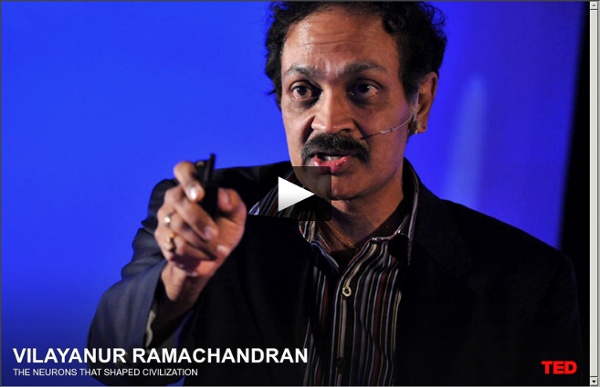



http://www.ted.com/talks/vs_ramachandran_the_neurons_that_shaped_civilization.html
Related: Brain&Mind Video • think • Mind and Soft Heart • science explains world • The BrainGreenberg Educational Consulting Organization Education should be a process and time of unfettered learning and exploration, but all too often it is bogged down with too many rules, short-sighted narrow focus, and a lack of inspired leadership. Education defines our society and if we want a humane and egalitarian society, we need leaders and members who all strive for the depth of knowledge, skill, compassion and wisdom that is achievable through simple daily practice and regular critical review. Because daily efforts require time, energy, and motivation and there is a lot of noise in society I am building this site to help you find and use ideas worth using. To help us all upgrade our mentality, wisdom, skill (add your goals here), what I’m working to build here is a site that works like a college education should – providing Exposure to people you haven’t met yet, ideas you haven’t heard yet and ways of thinking, arguing, and behaving that you haven’t done yet. Why mention all this?
50 Questions To Help Students Think About What They Think click 2x contributed by Lisa Chesser Using the right questions creates powerful, sometimes multiple answers and discussions. Aristotle said that he asked questions in response to other people’s views, while Socrates focused on disciplined questioning to get to the truth of the matter. Ultimately questions spark imagination, conjure emotions, and create more questions. There's a Word for That: 25 Expressions You Should Have in Your Vocabulary Recently I came across this amazing little Tumblr named ‘OtherWordly‘ – itself a play on words. It consists of a collection of strange and lovely words from different languages through different times. What I like most about this selection of consonants and vowels – little meaning-carrying packages of vibration – is that they all try to point to the unspeakable, the transient or the neglected.
Networks of Genome Data Will Transform Medicine Breakthrough Technical standards that let DNA databases communicate. Why It Matters Scientists Unveil a New Map of the Brain With Unrivaled Resolution In Brief The Allen Institute for Brain Science has published and released a comprehensive, high-resolution map of the brain anyone can access online. They mapped 862 brain structures from a single donor brain. Even with our growing knowledge of the cosmos, we are relatively clueless about how our own brains function.
Brain Pickings 09 MAY, 2013By: Maria Popova “When the profit motive gets unmoored from the purpose motive, bad things happen.” The question of how to avoid meaningless labor and instead find fulfilling work brimming with a sense of purpose is an enduring but, for many, elusive cultural ideal. Daniel Pink tackles the conundrum in this wonderful animation by the RSA — who have previously sketch-noted such fascinating pieces of cultural psychology as the truth about dishonesty, the power of introverts, where good ideas come from, what’s wrong with the left-brain/right-brain dichotomy, the broken industrial model of education, and how choice limits social change — based on his book Drive: The Surprising Truth About What Motivates Us (public library). Pink shares the counterintuitive results of two studies that reveal the inner workings of what influences our behavior — and the half-truth of why money can’t buy us satisfaction: Also of note is Pink’s TED talk on the subject:
How to improve your Critical Thinking skills: Interview with Dr. Gerald Nosich – Life Lessons In this article I interview an expert on Critical Thinking, Dr. Gerald Nosich from the Foundation for Critical Thinking, who has been teaching Critical Thinking since 1977 to find out how we can improve our Critical Thinking skills. In this article you will learn: Let’s start at the beginning… Michael: What is Critical thinking? Dr. I am sorry I am sorry You died last night. You were hit by a car at Howard & 7th in San Francisco when you were riding your bike through the intersection.
Vilayanur Ramachadran describes a type of neurons he calls 'mirror neurons'. Mirror neurons fire not only when experiencing a 'stimulus' but also when observing someone else experiencing the stimulus. They allow us to learn complex social behaviours. This presentation expands on his previous talk "VS Ramachandran on your mind" and shows results found by learning from brain damage. Vilayanur Ramachadran claims humans devellopped these mirror neurons about 100.000 years ago and afterwards human culture devellopped ashtonishingly fast; but compare this to "Susan Savage-Rumbaugh on apes". by kaspervandenberg Nov 5